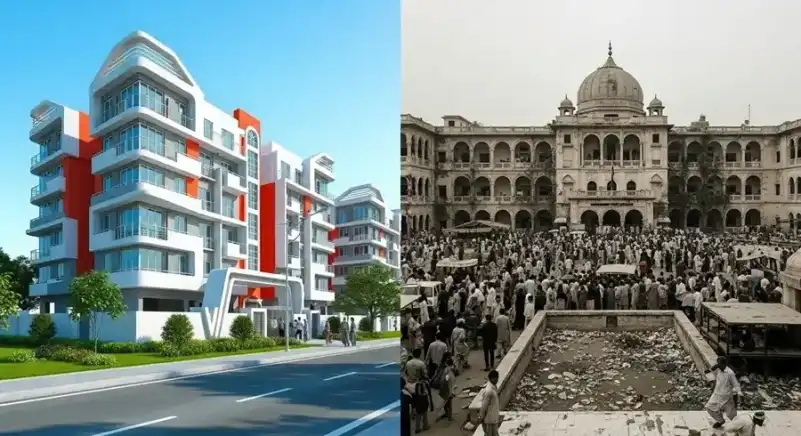
Government-maintained accommodation in Pakistan is a long-standing system that serves various government employees, including military personnel. While this arrangement has its merits, the growing financial burden of maintaining these accommodations is a significant concern for taxpayers. As the population and workforce grow, it’s crucial to explore innovative solutions to meet housing needs more efficiently. This article delves into the pros and cons of the current system and offers alternative approaches to reduce the strain on public finances.
Overview of Government-Maintained Accommodation in Pakistan
In Pakistan, government-maintained housing is provided to civil and military personnel as part of their employment benefits. These accommodations are built, maintained, and managed using public funds. While this system offers stability and convenience to employees, it also poses challenges, including rising costs, administrative inefficiencies, and insufficient housing to meet demand.
Pros of the Current System
- Employee Welfare:
- Government-maintained accommodations provide secure and affordable housing for employees and their families, ensuring stability and peace of mind.
- Proximity to Workplaces:
- Many government housing facilities are strategically located near offices, reducing commuting costs and time for employees.
- Standardized Housing:
- The system ensures uniformity in living standards, promoting equality among employees of the same rank.
- Incentive for Service:
- For military personnel and other government employees, housing serves as an added incentive to serve in remote or high-stress environments.
Cons of the Current System
- High Financial Burden:
- Construction, maintenance, and management of housing projects require significant public funds. These expenses divert resources from other critical sectors like education and healthcare.
- Inefficiency and Mismanagement:
- Bureaucratic delays and corruption often lead to inflated costs and substandard maintenance of housing units.
- Insufficient Housing Stock:
- With a growing workforce, the existing system struggles to provide housing for all eligible employees, leading to long waiting lists.
- Depreciation and Maintenance Costs:
- Over time, aging housing units require extensive repairs and upgrades, further increasing costs.
- Limited Flexibility:
- Employees are often restricted to living in assigned accommodations, which may not always align with their personal preferences or family needs.
Need for an Out-of-the-Box Solution
Given the financial and administrative challenges of government-maintained housing, there is a pressing need to explore alternative approaches that are cost-effective and sustainable. Below are some potential solutions:
1. Transition to Accommodation Allowances
How It Works
Instead of providing government-built housing, employees would receive a fixed accommodation allowance to rent or purchase a house in the private market.
Benefits
- Cost Savings: Eliminates the need for construction and maintenance of housing units.
- Flexibility: Employees can choose housing that suits their personal needs.
- Private Sector Engagement: Encourages growth in the real estate sector.
Challenges
- Potential rise in rental costs in urban areas due to increased demand.
- Need for a robust monitoring system to ensure fair distribution of allowances.

2. Public-Private Partnership (PPP)
How It Works
Collaborate with private developers to build and maintain housing units on a lease basis. The government can pay a fixed fee or subsidy for employee housing.
Benefits
- Shared Costs: Reduces the financial burden on the government.
- Improved Quality: Private developers may deliver higher-quality housing due to competition.
- Scalability: Easier to expand housing facilities as needed.
Challenges
- Requires strict regulation to prevent exploitation or cost overruns.
- Dependence on private entities may reduce government control over housing policies.
3. Privatization of Existing Housing Stock
How It Works
Sell existing government housing units to employees at subsidized rates, allowing them to become homeowners.
Benefits
- Revenue Generation: Funds from sales can be reinvested in other critical sectors.
- Empowerment: Employees gain asset ownership, promoting financial stability.
- Reduced Maintenance Costs: Shifts the responsibility of upkeep to homeowners.
Challenges
- Initial resistance from employees accustomed to rent-free housing.
- Requires a comprehensive plan to ensure fair pricing and smooth execution.
4. Hybrid Model
How It Works
Combine elements of the current system with new approaches. For instance, retain housing for key personnel (military, police) while offering allowances or PPP options for others.
Benefits
- Balanced Approach: Caters to the needs of essential workers while reducing overall costs.
- Gradual Transition: Allows employees and policymakers to adapt to new systems over time.
Challenges
- Complex implementation requiring clear guidelines and consistent monitoring.
Statistical Insight
- Pakistan’s government allocates billions annually for housing-related expenses, yet approximately 30% of eligible employees still lack access to official accommodation.
- Maintenance costs for government housing increase by 10-15% annually, exacerbating budgetary pressures.
- Transitioning to an allowance-based system could save up to 40% of current expenditures, according to some financial analyses.
Conclusion
The traditional model of government-maintained accommodation in Pakistan, while beneficial in many ways, is becoming increasingly unsustainable. Exploring innovative solutions like accommodation allowances, public-private partnerships, or privatization can significantly reduce financial burdens while improving employee satisfaction.
A phased approach with clear policies, stakeholder engagement, and efficient monitoring is essential to ensure the success of these reforms. By adopting an out-of-the-box solution, Pakistan can redirect valuable resources toward other national priorities, fostering long-term economic growth and development.
#GovernmentAccommodation #CPEC #MilitaryHousing #HousingReformsPakistan #PublicPrivatePartnership #EmployeeBenefitsPakistan
10 Comments
Thank you very much for taking insterest and reading this article. I am available to answer any question that you will share with me.
I was able to find good info from your content.
What a stuff of un-ambiguity and preserveness of valuable experience
about unexpected emotions.
What’s up to all, as I am really eager of reading this website’s
post to be updated on a regular basis. It includes pleasant data.
Hey There. I discovered your weblog the use of msn. That is a really neatly written article. I’ll be sure to bookmark it and come back to read more of your helpful info. Thank you for the post. I’ll definitely return.
Somebody necessarily assist to make significantly posts I might state.
That is the very first time I frequented your website page and so far?
I amazed with the research you made to create this actual publish extraordinary.
Great process!
Nice blog right here! Also your website a lot up very fast!
What host are you the use of? Can I am getting your associate link for your host?
I wish my site loaded up as fast as yours lol
I just couldn’t go away your site prior to suggesting
that I actually enjoyed the usual information a
person provide for your visitors? Is gonna be again regularly to investigate cross-check new posts
Nice



Your point of view caught my eye and was very interesting. Thanks. I have a question for you.